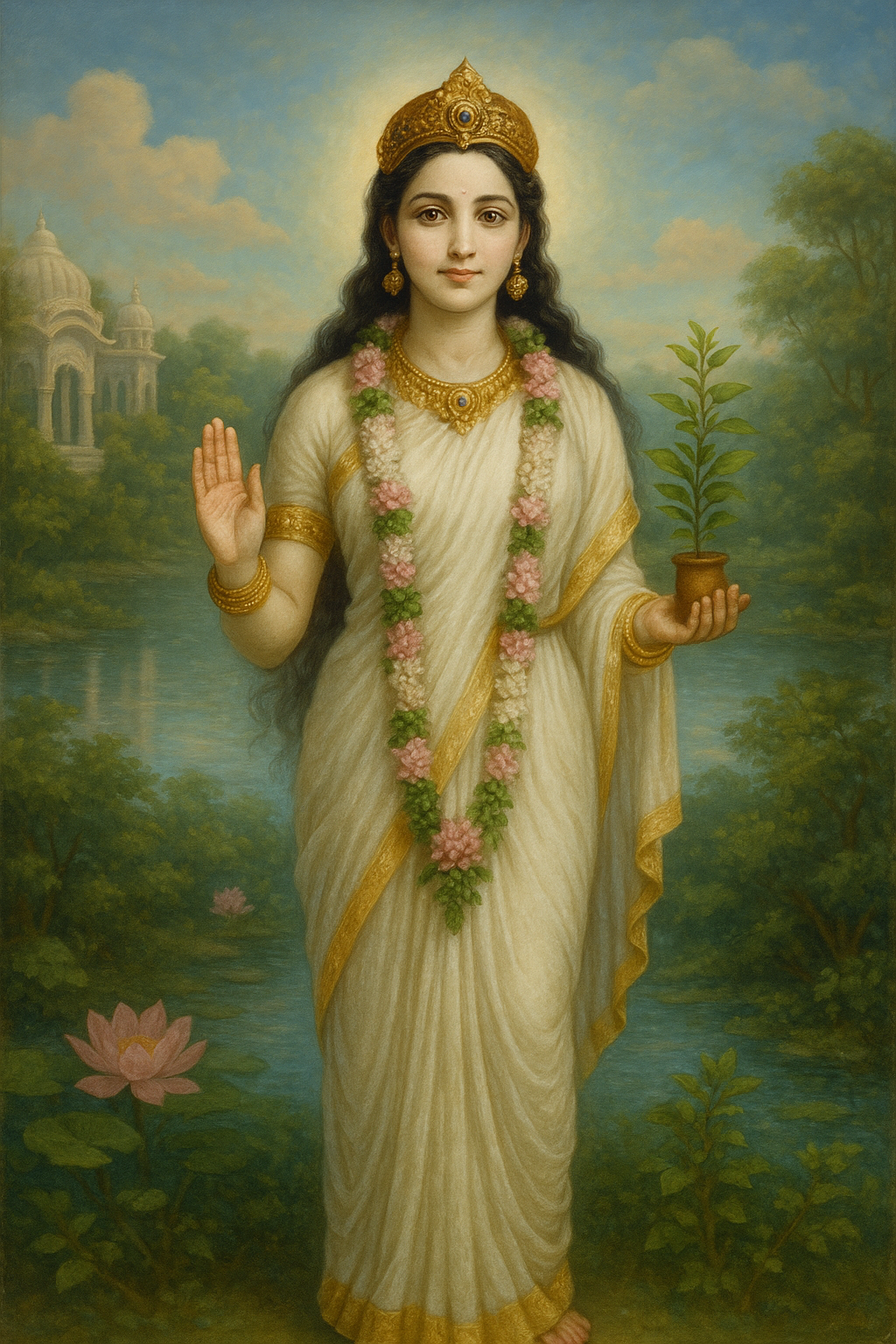The Scriptures Speak of Tulasī’s Unparalleled Greatness
Among all the sacred texts of the Vedic tradition, none fail to glorify Tulasī Devī. From the Padma Purāṇa to the Skanda Purāṇa, the Garuḍa Purāṇa, Agni Purāṇa, and Viṣṇu Dharmottara, her praises resound again and again—like the ringing of a divine bell that awakens bhakti in the heart.
The Padma Purāṇa proclaims:
“Whoever offers Me a Tulasī leaf with devotion pleases Me more than with thousands of other offerings.”
The Skanda Purāṇa adds:
“Wherever the wind carries the scent of Tulasī leaves, it purifies everything—even the remnants of sin and degradation.”
Tulasī Devī is called Viṣṇupriyā, the beloved of Lord Viṣṇu, and Hari-vallabhā, the dearmost one to Hari. Her very form is considered non-different from pure devotion (śuddha-bhakti).
The Supreme Reward for Worshiping Her
The Agni Purāṇa asserts that worshiping Tulasī grants the reward of visiting all holy places, performing all sacrifices, and chanting all mantras. She is the abode of all tīrthas, and her presence alone invokes auspiciousness in the home.
In the Viṣṇu Dharmottara Purāṇa, it is written that the mere sight of a Tulasī plant destroys great sins, and whoever touches or bows to her receives the blessings of all the gods.
Tulasī’s leaves, wood, and fragrance are sacred. No part of her is material. Her leaves are used in offerings, her wood in japa beads, her flowers in garlands for the Lord, and even her soil is considered holy.
Even the dust from her roots is described as more purifying than bathing in the Ganges.
Tulasī as the Bestower of Bhakti
The Skanda Purāṇa further states that Tulasī Devī is the eternal form of bhakti, and that without her grace, it is impossible to attain Kṛṣṇa’s lotus feet. She acts as the messenger, the servant, and the gateway to the Lord.
The scriptures warn that no one should offend or neglect her, and that plucking her leaves without reverence invites offense. But for one who serves and protects her, Tulasī Devī becomes the most loving mother, showering the devotee with prema-bhakti.
Thus, through the vast ocean of śāstra, her supremacy is declared again and again—not just in poetic praise, but as an eternal truth in devotional life.
Lessons to Be Learned
1. Scriptures Are United in Praising Tulasī’s Supreme Position
From Purāṇas to Tantras, every sacred text affirms that Tulasī is not a mere plant, but a divine personality. Śrīla Prabhupāda taught that the authority of śāstra is the foundation of bhakti. When all śāstra agrees on Tulasī’s glories, we must approach her with awe and love.
2. Bhakti Is Incomplete Without Her Participation
The Lord does not accept offerings made without Tulasī. This shows that the devotee is always essential to the Lord’s pleasure. Just as Rādhārāṇī is the hlādinī-śakti, Tulasī is her expansion in the world, facilitating our entrance into service.
3. Tulasī Is the Essence of All Pilgrimage and Worship
Śrīla Prabhupāda often said that all holy places are present where Tulasī is worshiped. Even if one cannot travel, perform yajña, or chant perfectly, serving Tulasī compensates and completes all.
4. The Offense of Neglecting Her Should Be Avoided
As warned in scripture, plucking her carelessly, using her for decoration, or disregarding her personhood is offensive. Devotees must approach her like one approaches a saintly Vaiṣṇavī—with bowed head and gentle hands.
5. Śrīla Prabhupāda Instructed Devotees to Center Daily Worship Around Tulasī
He insisted that Tulasī āratī be performed daily, and that devotees chant before her, beg for her mercy, and protect her with care. In his words:
“Without Tulasī, there is no devotional life. Worship her, circumambulate her, and beg her to grant entrance into Kṛṣṇa’s service.”



